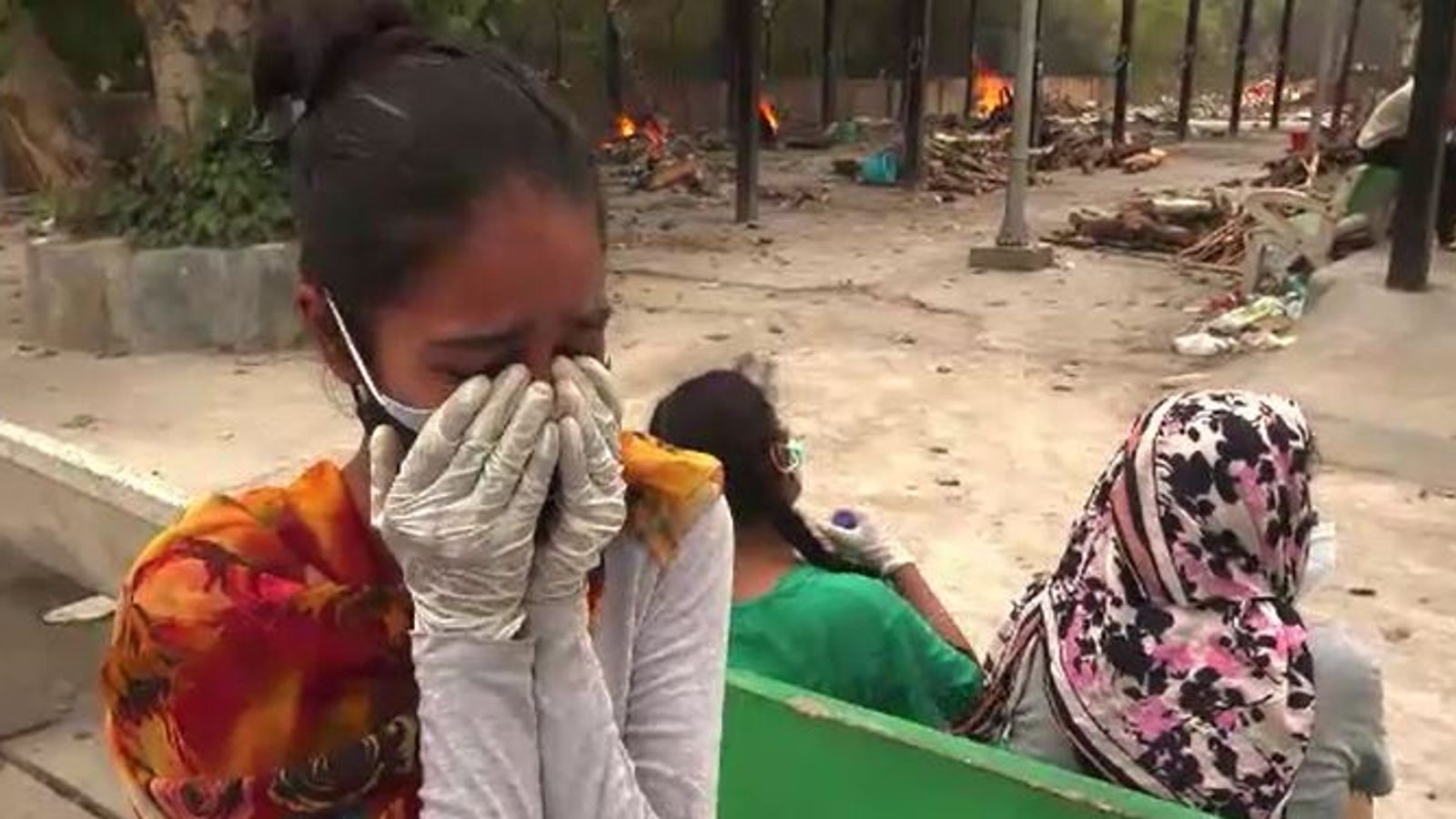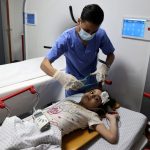The massive surge in coronavirus cases in India has brought out a very dark side of humanity where it’s literally a fight to survive; where black marketeers are profiting off people’s misery and hiking up the price of oxygen and cylinders as the sick scrap and barter for life.
But it’s also highlighted another side – of stunning courage and selflessness.
The bravery of the volunteers who’ve put themselves on the frontline of this war against the virus is quite something to behold.
They are deliberately putting themselves in harm’s way, doing jobs they don’t need to do and stepping out into the teeth of a ferocious pandemic when they know there’s a shortage of pretty much everything you can think of, should they get sick.
Yet, they still do it – for no other reason than the satisfaction of perhaps making a difference to someone else.
Twenty-five-year-old Paramjeet Singh is the youngest of a volunteer team of four linked to the International Sikh charity.
For a young man, he’s seen a lot of death over the past year.
Too much.
And that has probably quadrupled over the past few weeks in Delhi as the numbers of those going down with the virus has reached global record highs.
He’s usually a computer engineer but the pandemic has seen him switch to doing one of the most gruesome tasks you could imagine – collecting bodies.
“It is tough but we’ve got no other choice,” he explains.
“It is heart breaking but if we break down, how could we help? There’s a shortage of ambulances, people are dying at home, nobody is there to take the bodies from home. And if people like us break apart then how are people going to survive? We cannot stop. Yes, we also feel the emotions but we can’t even cry in front of people because that’s what we have to do, all the day.”
He tells us matter-of-factly that he and the rest of his team collect about 10 to 12 COVID dead every day. They start early, around 7am, and only stop after dusk. By the time we join them mid-morning, they’ve already collected five dead bodies from five different homes across the capital.
Usually, the family themselves are terrified to touch the relative who’s passed away. The neighbours are too frightened to help. There are no ambulances to turn up and retrieve the body. And COVID protocols mean the body should go straight to the crematorium.
“We turned up to a house yesterday where the body had lain for three days,” Paramjeet tells us. He himself has suffered with COVID, both his parents are currently ill with it and a few days earlier his uncle had died from it.
Hours after we leave him for the day, he tells us his best friend, who was only 25-years-old like himself, had succumbed to the virus after being treated for a week in hospital.
When we’re with him, he and the other volunteers are dressed in minimal PPE, with flimsy, almost transparent white overalls, gloves, visors and masks – and in this blistering heat (around 40C) this is suffocatingly uncomfortable.
They heave the bodies into the back of a small, battered car which they’ve adapted into an ‘ambulance’ with stickers on the rear bumper and their charity name on the side. The back seats are folded down to allow the cadaver to fit in. “It’s good today that we have four of us,” Paramjeet says. “Sometimes when there’s only two of us, we find it hard to lift the bodies.”
They wrap the corpse in blankets and try to offer comfort to the relatives who’re usually in shock and reeling from the ferocity of the virus and their frantic race to try to get help for their sick, loved one in the days and hours before death takes hold.
The volunteer team we’re with is made up of two men who’re usually running their own businesses and a third who is a photographer. They go about their work silently and with a grim efficiency, constantly spraying themselves with sanitiser, repeatedly fielding calls from people asking for help and racing from address to address.
One apartment we arrive at is on the second floor, up a winding, narrow staircase. The dead man is Devinder Singh, a 63-year-old father of two daughters. His wife Manmeet Kaur is sobbing. She’s busy climbing into a Hazmat suit as we enter. “How can somebody who’s lost everything put into words what this means? My girls are all alone now.”
Her elder daughter Simran Kaur asks the volunteers if they’ll be allowed to turn up at the crematorium for the funeral without PPE. The volunteers, who’ve done this many times before, reassure her it will be allowed and they’ll help with the making of the pyre and organising the Hindu rituals for them.
Please use Chrome browser for a more accessible video player
There’s an undignified struggle to get the corpse down the tiny staircase but somehow they manage it between them, all sweating profusely. By the time they carry the body into their vehicle, the neighbours are outside, many of them with their hands pressed together in prayer and respect. They’re all well aware it could be them next. The family follow the makeshift ambulance to the crematorium on two scooters, two astride. There’s no other way they could have gone to the graveyard without these volunteers’ help.
There’s a lot of activity at the crematorium. The family realise they’re just one of dozens and dozens of others suffering tragedy. Wood is being chopped up and carts piled high. Logs are being dragged to and fro to each funeral platform. The Kaur family watches as a pyre is built in rapid time.
Simran – who is only 26 years old and now the head of the family – is given a brief lesson in a hastened set of rituals.
Ordinarily women do not carry out these rituals but these are extraordinary times and there are no men in the family. The women hug each other, sobbing.
They invite us to watch and record the events. It’s important to them that this death is marked in some way.
Simran speaks to us between sobs, tears running down her cheeks. “When I was on the way here, I just felt that humanity has died. There’s no humanity, except for few.”
“There’s a huge population here but there are two shades of humans – and only a few humans who are living with humanity.”
She tells us how grateful she is to the volunteers – one of whom is almost the same age as her, who is also carrying a heavy burden in his heart. She knows they’ve pulled out all the stops to help her family in its hour of need. “These are important rites for us,” she says. “I am genuinely grateful to them for helping us give my father his dues and respect.”
She goes on to thank those neighbours and friends who were with them to her father’s end.
“I want to thank all those people who came and helped us out, who came out from their houses despite all the infection and everything to help us.
“There are doctors who phoned me at midnight to find out if my father was alright because I didn’t get beds in the hospital. They used to call me every night… they didn’t get time in the morning or through the day but they responded on messages and called me at midnight… to check if my father’s ok and if he’s improving.
“They guided me throughout without even taking any fees… there should be more people like that in society.
“But they are few. I really feel there’s a big failure of judiciary, of the nation, by so many people who cheated me on cylinders, who didn’t give me the facilities on time… and my father couldn’t get anything on time… everything got delayed, everything… no reports on time, no medicines on time, no cylinders, nothing.”
It is terrifically sad listening to her, a story which has been told to us over and over and over again over the past week or so. It’s a repeated story of organisational failure; of government hubris; of at best, national ineptitude; and at worst, political negligence.
Follow the Daily podcast on Apple Podcasts, Google Podcasts, Spotify, Spreaker
It’s a story riddled with claims of corruption, big and small, of profiteering and of greed. It’s not a story unique to India by any means. Almost every country in the world suffering with high numbers of coronavirus deaths has been the result of political ineptitude, poor planning and highly dubious dithering decision-making.
But in India size matters. It is the second most populous country in the world so when mistakes are made, they hit on a scale most of us find hard to grasp. The numbers of sick now involved would crush and crumple probably every health service on the planet – never mind one which has been underfunded for decades.
We asked Simran who she blamed as she stood weeping on the side of her father’s funeral pyre. “There’re so many who’ve just played with the lives of people… who don’t understand the value of human life. It could be any of them… doctors, nurses, the people who are doing black marketing… I really appreciate and I’m grateful to the frontliners but there are so many others who are creating havoc through the black marketing and other things… They are creating the crisis… corona itself is not a crisis. They are making it a crisis.”






















